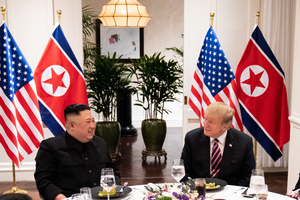 US President Donald Trump and North Korean leader Kim Jong-un, meet for a social dinner on Feb. 27, 2019, at the Sofitel Legend Metropole hotel in Hanoi, for their second summit meeting. (White House)
US President Donald Trump and North Korean leader Kim Jong-un, meet for a social dinner on Feb. 27, 2019, at the Sofitel Legend Metropole hotel in Hanoi, for their second summit meeting. (White House) A surprise meeting between the US and North Korean leaders during US President Donald Trump’s visit to Asia late this month appears unlikely, experts said, tempering speculation raised by a recent CNN report that Washington officials have quietly been weighing such an encounter.
CNN reported Saturday that Trump administration officials were “privately discussing” the possibility of a meeting between Trump and Kim Jong-un during the US president’s planned trip to Asia later this month, though no logistical arrangements or direct contact with Pyongyang have been made. The network said previous US outreach earlier this year had been rejected by North Korea.
Yang Moo-jin, a professor at the University of North Korean Studies in Seoul, said Washington appears to be informally exploring contingency plans, but that Pyongyang has yet to offer any “meaningful response.”
“The situation today is very different from June 2019, when Kim and Trump met at Panmunjom,” Yang said. “At the time, even after the failed Hanoi summit, North Korea still hoped for a new approach from the US and maintained some expectation of renewed talks. Now, Pyongyang firmly rejects denuclearization, and its strategic alignment with China and Russia has only grown stronger.”
Yang said the possibility of a surprise meeting remains slim, particularly as North Korea would face political pressure to resume negotiations afterward. “Even a casual encounter would carry symbolic implications that Pyongyang may not want,” he added.
Lim Eul-chul, a professor at Kyungnam University’s Institute for Far Eastern Studies, echoed Yang’s skepticism, saying that while “all possibilities remain open,” the likelihood of a surprise Trump-Kim encounter is “very low.”
Lim argued that North Korea’s strategic posture has shifted fundamentally since 2019. “Denuclearization is no longer a negotiation position — it is national policy,” he said. “North Korea now considers itself a de facto nuclear state, with strong backing from China and Russia. The US simply lacks the leverage it once had.”
He added that Pyongyang remains haunted by the “Hanoi trauma,” unwilling to risk another failed summit that could undermine Kim’s authority. “A new meeting would require guaranteed outcomes and detailed presummit coordination — none of which exist,” Lim said.
Lim also pointed to Trump’s reoriented foreign policy focus, noting that the US president’s Asia tour is aimed primarily at easing trade tensions with China, not reigniting talks with Pyongyang. “For Trump, meeting Kim might be tempting as political theater, but for Kim, the risks far outweigh the rewards,” he said.
With North Korea’s 9th Party Congress approaching — a critical domestic event to set future policy — Kim has “little incentive to pursue a meeting that offers more risk than benefit,” Lim explained.
Both experts said a renewed US-North Korea engagement could only occur under major shifts in geopolitical stances from both sides. Yang suggested that Trump could use such an encounter to burnish his image as a global peacemaker, while Kim could leverage it to project leadership stature at home. Yet both experts acknowledged that without tangible progress on denuclearization or sanctions relief, any meeting would be purely symbolic.
Lim agreed, noting that Kim’s recent comment that “time is on our side” reflects Pyongyang’s belief that it can afford to wait, strengthening its nuclear capabilities while relying on tacit support from Beijing and Moscow.
“North Korea believes it gains more by sitting tight than by sitting down,” he said.
Still, Yang did not rule out the chance entirely. “Given Trump’s unpredictable diplomatic style, a brief, informal exchange cannot be completely excluded,” he said, suggesting the Freedom House at Panmunjom could again serve as a possible venue.
Seoul’s top envoy to Washington, Ambassador Kang Kyung-wha, on Friday, dismissed any concrete signs of a planned summit.
“President Trump has said he is open to dialogue, and North Korea has also shown an indication leaning toward dialogue. But there is no sign yet that something will materialize on the occasion of APEC,” Kang said during a parliamentary audit at the South Korean mission to the UN in New York.
She added that Seoul continues to monitor developments while “leaving open that possibility,” as Trump prepares to travel to Korea for the APEC gathering in Gyeongju, North Gyeongsang Province. The APEC summit will be held on Oct. 31 and Nov. 1, but Seoul expects Trump to visit the country on Oct. 29-30, according to national security adviser Wi Sung-lac.
In August, Trump said he would be open to meeting Kim following his first summit with South Korean President Lee Jae Myung at the White House. The White House has since reiterated that Trump remains willing to talk to Kim “without preconditions.”
Trump’s previous personal diplomacy with Kim produced three historic meetings between 2018 and 2019, but failed to yield progress toward denuclearization. Since then, Pyongyang has strengthened its nuclear arsenal, deepened ties with Moscow and Beijing, and formally declared South Korea an “enemy state,” drastically altering the diplomatic landscape.
mkjung@heraldcorp.com
